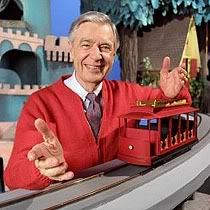A Neighbor in the Neighborhood

"Discovering the truth about ourselves is a lifetime's work, but it's worth the effort." -Fred Rogers
I can still remember the highschool assembly when my Japanese teacher talked to us about Mister Rogers. I was totally shocked ... dumbfounded to learn that this man held a couple masters degrees and was an ordained presybeterian minister.
My experience had been that very educated people (and often ministers too) tended to address very high-minded ideas in very high-minded ways. And if they couldn't do this, then they addressed ordinary things in high-minded ways. But not Fred Rogers.
Certainly Mister Rogers was an educator ... but unlike the ocean of teachers who stammer on and on about how to perfect "the system" and how education can bring meaning to life, Mr. Rogers seemed perfectly content to talk about how flashlights work, how he couldn't describe the way popcorn tasted, and doing whatever he could to relate to his audience.
Another thing about people with Masters degrees: they often make the distinction of their education as direct and recognizable as they can. Mister Rogers never presented himself as a man of worldly distinction. He seemed totally satisfied putting on his jacket. The set was at his "house", and he seemed very at home interacting with children.
"Blessed are the meek for they shall inherit the earth"
A surprising story I read on wikipedia: apparently Fred Rogers drove an older Impala. One day Mister Rogers went to leave the studio and it was missing. This made headlines: "Mr. Roger's car has been stolen". The car showed up in the exact spot it was left with a note: "If we had known who the owner was, we wouldn't have stolen it!"
Another example: Eddie Murphy played a satirical version of Mr. Rogers on Saturday Night Live. Sure, it's easy to laugh at people who have simple-minded things to say. But when Murphy had the chance to meet Mr. Rogers he respectfully called him, "The real Mr. Rogers."
The stories about people respecting Mr. Rogers go on and on. I'm leaving out the story where the Supreme Court directly cited his testimony in a VCR case. Why do people strive so diligently to achieve wordly distinctions when a person who they consider to be great seems to have no wordly distinction or holds them very loosely?
Labels: Childhood


0 Comments:
Post a Comment
<< Home